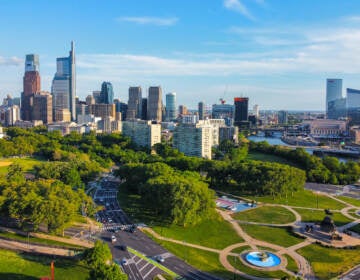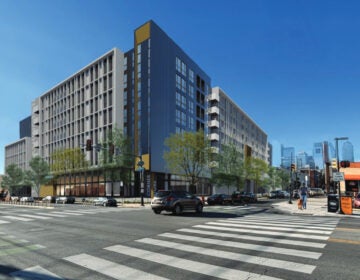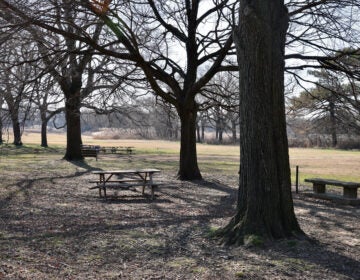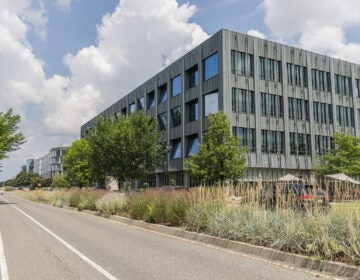Fees proposed for Philly developers who don’t replace trees they take down
Councilmember Katherine Gilmore Richardson proposes a sweeping ordinance to increase the city’s tree cover and cool down neighborhoods.
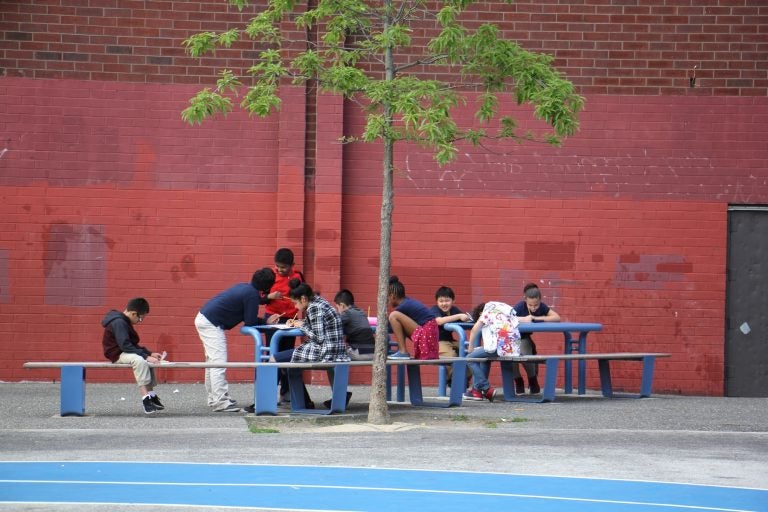
File photo: Trees shade outdoor learning spaces on the Taggart School playground. (Emma Lee/WHYY)
With temperatures rising due to climate change, Philadelphia city officials and advocates want to increase the city’s tree cover to help keep neighborhoods cool. But the city has been losing trees in recent years.
A member of City Council introduced a bill Thursday that aims to reverse this trend.
“This is a really important next step in the process of ensuring that we not only keep our tree canopy, but increase our tree canopy across the city of Philadelphia,” said Councilmember Katherine Gilmore Richardson, the bill’s sponsor.
The city lost 6% of its tree canopy from 2008 and 2018, largely in residential areas.
Some Philly neighborhoods have more trees than others — which contributes to temperature differences of up to 22 degrees Fahrenheit.
“This is a major environmental justice issue, particularly for our historically underserved communities in Philadelphia — neighborhoods that will typically struggle with urban heat islands, with lack of tree canopy coverage,” Gilmore Richardson said. “Those neighborhoods are historically hotter than all of the other areas in the city.”
Gilmore Richardson’s proposed legislation would increase tree preservation and planting requirements for developers and eliminate some exemptions to existing rules, including for parkland.
It would create a fund to pay for tree planting across the city, drawn from new fees that developers would pay if they remove trees and don’t replace them, which could total tens of thousands of dollars. It would also require developers that cut down a certain number of trees to alert nearby residents and the city’s new Environmental Justice Advisory Commission, staffed by engaged citizens.
The bill would expand requirements for vegetated buffers between different zoning districts and add buffer requirements along railways or major thoroughfares. It would also increase planting requirements for parking lots, and require more yard trees on multifamily residential and commercial properties.
The legislation is a response to the draft recommendations in the Philly Tree Plan — which the city is expected to finalize in the coming months.
The version Philadelphians commented on late last year recommended the city increase the number of trees developers are required to plant and institute fees for not meeting these. It also recommended creation of a tree fund, like the one Gilmore Richardson is proposing, which would go toward zoning code review, enforcement of new tree policies and investments in communities.
The draft plan also recommended a requirement for community approval for removal of all non-invasive tree species with a trunk more than two feet wide.
“That’s why we added the component of ensuring that the community is notified,” Gilmore Richardson said. “Because the community was such a large part of the process around the development of the Tree Plan and the draft recommendations. And we want to honor that in the spirit, in the body of this legislation.”
Council could vote on Gilmore Richardson’s bill in the coming weeks.
 WHYY is one of over 20 news organizations producing Broke in Philly, a collaborative reporting project on solutions to poverty and the city’s push towards economic justice. Follow us at @BrokeInPhilly.
WHYY is one of over 20 news organizations producing Broke in Philly, a collaborative reporting project on solutions to poverty and the city’s push towards economic justice. Follow us at @BrokeInPhilly. WHYY is your source for fact-based, in-depth journalism and information. As a nonprofit organization, we rely on financial support from readers like you. Please give today.





